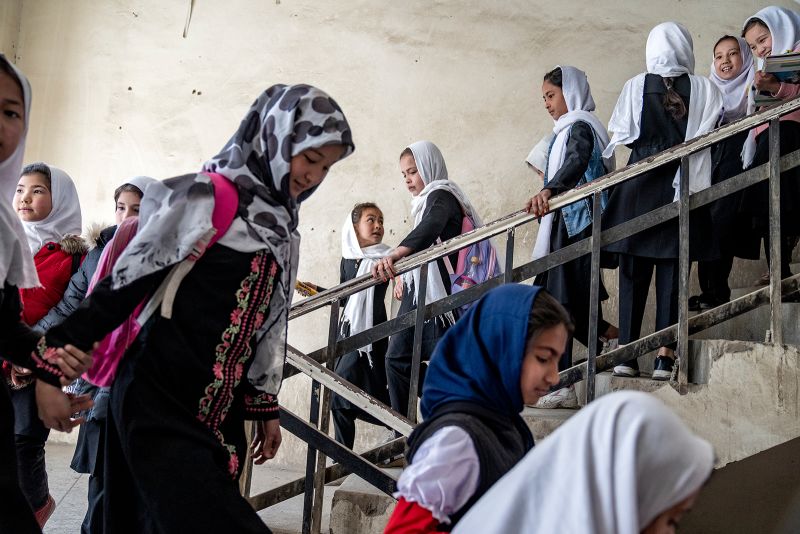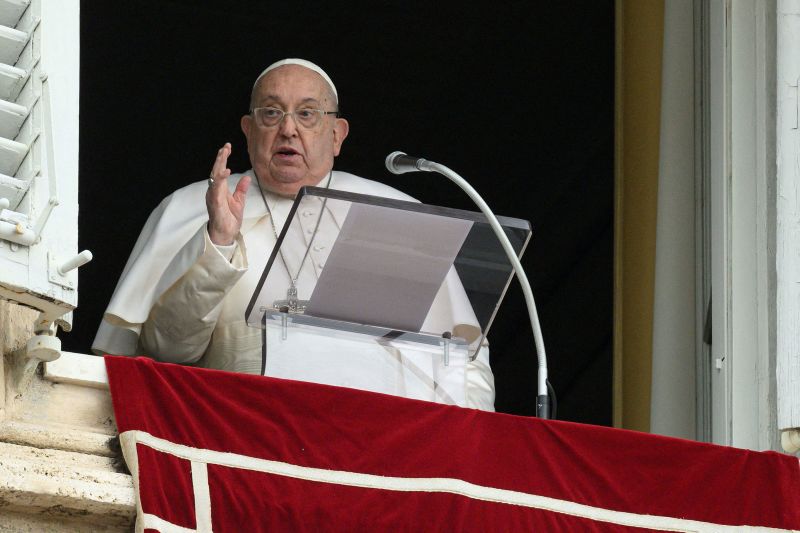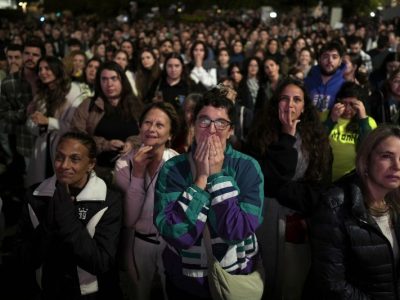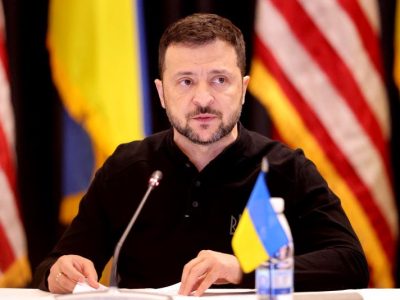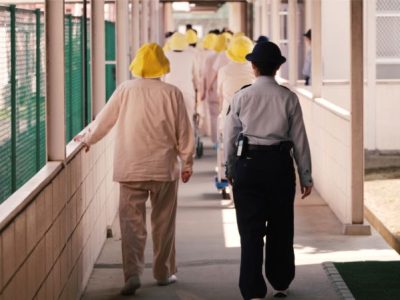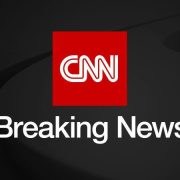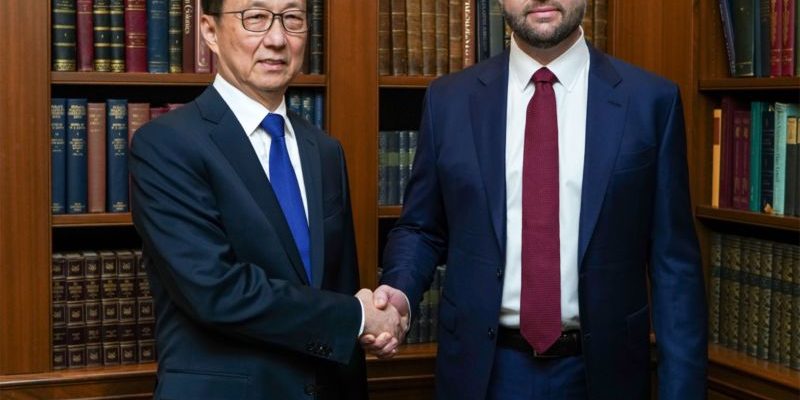
Chinese leader Xi Jinping may not have personally accepted US President-elect Donald Trump’s invitation to his inauguration, but Beijing has taken the rare step of dispatching a top official to join the swearing-in ceremony in Washington.
Chinese Vice President Han Zheng is expected to attend Monday’s inauguration after meeting incoming US Vice President JD Vance Sunday, in a trip observers say is a significant – but potentially risky – goodwill gesture as Beijing looks to avert major friction with Trump and his incoming cabinet of China hawks.
While Han is the most senior Chinese official to attend a US inauguration, his position of vice president is largely symbolic within China’s political system. True authority lies with the ruling Communist Party’s powerful Politburo Standing Committee, from which Han retired in 2022.
But sending a high-profile official – and one who has previously represented Xi at international events including the coronation of Britain’s King Charles III – signals Beijing’s interest in a reset of fraught relations between the US and China, observers say.
Han has used the visit to meet with members of the American business community, including Tesla CEO and close Trump associate Elon Musk, according to Chinese state agency Xinhua.
In his meeting with Musk, Han called on American companies, including Tesla, to promote US-China trade relations, Xinhua reported. Tesla operates its largest manufacturing plant outside the United States in Shanghai. Musk has yet to confirm the meeting.
Han’s arrival in the US follows a phone call between Xi and Trump Friday, where the Chinese leader congratulated Trump on his reelection and called for a new start in relations.
“We both attach great importance to our interactions, both hope for a good start of the China-US relationship during the new US presidency, and are willing to secure greater progress in China-US relations from a new starting point,” Xi told Trump in the call, according to a readout from the Chinese Foreign Ministry.
Trump confirmed on his social media platform Truth Social that he held a “very good” phone call with Xi, and that they discussed subjects including trade, fentanyl and Chinese-owned social media app TikTok.
The incoming US president on Sunday also pledged to delay enforcement of a controversial law, upheld by the Supreme Court last week, that would see the app banned in the US if its China-based parent company Bytedance does not divest it.
The app – whose fate is closely tied to tech and national security frictions between the US and China – went dark for roughly 12 hours over the weekend before restoring service following Trump’s statement.
TikTok CEO Shou Zi Chew is expected to be seated prominently at the incoming president’s inauguration Monday.
Han in Washington
China’s Han and Vance discussed a “range of topics including fentanyl, balancing trade, and regional stability” in their meeting, the Trump-Vance transition team said in a statement on Sunday.
In its readout of the meeting, Chinese state media outlet Xinhua said Han stressed that China is willing to work with the United States to “promote the stable, healthy and sustainable development of China-US relations.”
Han also acknowledged “differences and frictions” over economics and trade, but pointed to the “common interests” and “space for cooperation” between the two countries and called for them strengthen dialogue and consultation, Xinhua reported.
Han’s attendance at the Trump inauguration comes as Trump has broken with precedent set by recent administrations to invite foreign leaders, including Italy’s right-wing leader Giorgia Meloni and Argentina’s Javier Milei.
The incoming president’s invitation last month to Xi – the authoritarian leader of America’s main geopolitical rival – was an exceptionally rare gesture, particularly as the incoming president campaigned on ratcheting up economic competition with China and placing hefty tariffs on Chinese goods.
Xi would have been highly unlikely to attend Monday’s exercise in the democratic transfer of American power, given both the geopolitical context and the lengthy and detailed preparations that typically precede any travel by the Chinese leader.
Chinese ambassadors to the US have attended recent inaugurations, as is standard for many countries, though China’s Foreign Ministry did not confirm that then-Ambassador Cui Tiankai attended President Joe Biden’s.
US-China relations have frayed in recent years, over myriad issues. Those issues include Beijing’s mounting aggression in the South China Sea and toward the self-ruling democracy of Taiwan, as well as US efforts to limit China’s access to American high tech – stressors unlikely to change any time soon, regardless of who is in the White House.
But pushing for less fractious relations is in Beijing’s interests, observers say, as it seeks to stabilize its ailing economy and avoid deepening a damaging tech and trade war with its top single-country trade partner.
In a meeting with representatives of the US-China Business Council, the US Chamber of Commerce and other business people on Sunday, Han called the American business community the “backbone of US-China relations,” according to Xinhua. Han said he hoped that American businesses would “continue to invest in China” and play an “active bridging role” between the two sides, Xinhua reported.
His comments follow what has been a period of trepidation for the American business community about doing business in China, given tensions between the two countries and Beijing’s tightened regulatory scrutiny over foreign access to sensitive information.
Chance for a reset?
Dispatching Han for the inauguration sends a message that “China takes (Trump’s) invitation seriously and is willing to take the risk,” said Yun Sun, director of the China Program at the Stimson Center think tank in Washington.
That risk, Yun said, is that Trump slaps tariffs on China just days after entering the White House – a move that Beijing would see as making it look foolish.
On the campaign trail, Trump threatened levying tariffs of upwards of 60% on Chinese imports to the US. In November, he said that China will face higher tariffs on its goods – by 10% above any existing tariffs – citing the role played by Chinese suppliers in America’s drug crisis.
Beijing is not alone in facing such economic threats. A procession of world leaders and their representatives have jostled for meetings in recent months to start building a rapport with Trump, who is known to link foreign policy with personal chemistry.
But even as Beijing faces looming economic frictions and suspicions about its ambitions from within the incoming administration, it’s still likely to see opportunity within Trump’s presidency, observers say.
During the Biden administration, Beijing baulked at US efforts to deepen security coordination with American allies in Asia, as well as the president’s stated support for the US defense of Taiwan, the self-ruling island that Beijing claims.
Now, it sees an opportunity as the incoming Trump administration will come in with its own, distinct priorities for its China policy, according to Suisheng Zhao, director of the Center for China-US Cooperation at the University of Denver.
Trump is expected to focus on economic competition with China rather than on the threat of Beijing to an American-led liberal world order, as the Biden White House did. The incoming president has also in the past expressed an affinity with Xi, calling the Communist Party leader “tough” and “smart.”
“Trump likes Xi Jinping, he likes strongmen, strong leaders,” Zhao said. “Xi Jinping senses these opportunities, and he is equally eager to reset and to test the water at this time.”

